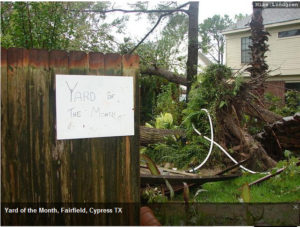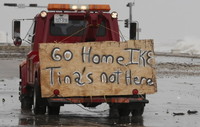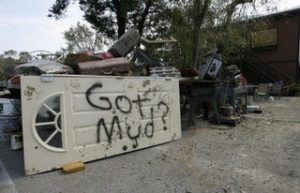 Hurricanes, tornados, mudslides, firestorms, floods, ice storms, blizzards, riots – there are many different kinds of disasters that can affect a law firm. Savvy lawyers create a disaster preparedness plan before trouble strikes, and then do their best to cope with the ultimate results. There are two things you might not think to include in your disaster survival kit, however – humor and gratitude.
Hurricanes, tornados, mudslides, firestorms, floods, ice storms, blizzards, riots – there are many different kinds of disasters that can affect a law firm. Savvy lawyers create a disaster preparedness plan before trouble strikes, and then do their best to cope with the ultimate results. There are two things you might not think to include in your disaster survival kit, however – humor and gratitude.
Gratitude as a Survival Tool
I began writing this during the 12th day without electricity following Hurricane Ike, which knocked out electric service to 90% of Houston. Even though personally I was fortunate to sustain only a minimum of damage, trying to live and conduct business without electricity (and therefore air conditioning, refrigeration, lights, microwaves, stoves, computers, Internet, email and sometimes telephones) creates challenges that fray the nerves. When I found myself feeling irritable, I knew that I was starting to engage in a futile internal battle with “what is.” That’s when turning to gratitude saved the day for me.
In the midst of the chaos and frustration of coping with the aftermath of Ike, I found a lot to feel gratitude for. I remembered that I was not one of the people with a tree through my roof or the mucky residue of flood waters in my home. I felt grateful for little things like a sudden breeze, or the fact that I don’t live in this hot and humid climate without air conditioning all the time, like people in the previous century did. I felt gratitude for big things like the fact that all of my loved ones, even my pets, were safe and sound. I didn’t live or work in Galveston or on Bolivar peninsula, where many lost their homes and others still struggle without basic services more than three weeks later. I expressed gratitude over how the problems I worried about last month now seem small.
Each time I ticked off a few things I felt grateful for, I felt a little more peaceful, a little more relaxed. It turns out that there is scientific support for the benefit of gratitude lists. Robert A. Emmons of the University of California, Davis, and by Michael E. McCullough of the University of Miami researched the impact of listing gratitudes.
Emmons and McCullough compared people who kept a weekly record of hassles or neutral life events to people who kept a weekly gratitude record. Those who expressed gratitude reported fewer physical symptoms, exercised more regularly, and felt better about their lives. They were also more likely to make progress on their goals, whether academic, interpersonal or health-based, over a two-month period.
Whether dealing with daily hassles or a genuine disaster, it is pretty common to want sympathy and to play “ain’t it awful” by recounting everything that has gone wrong. Consider the effect that you are having on your own health and the success of your practice, however. Be sure to at least include an equal dose of gratitude for what’s going right.
The Healing Quality of Humor
Your grandmother probably told you that “laughter is the best medicine.” Studies validate her wisdom and demonstrate that humor and fun strengthen your immune system, stabilize blood pressure, stimulate circulation and increase the flow of oxygen to muscles. Humor relieves stress and helps us cope, so be sure to pack a funny bone into your disaster preparedness kit.
Here are a few of the ways that survivors of Hurricane Ike have used humor to cope.
• Several homeowners posted “Yard of the Month” signs on their debris-strewn lawns.  Photo at Yard of the Month.
Photo at Yard of the Month.
• One home had a boat lodged against it in the front yard. Propped against the boat was a displaced harbor sign that read: “No wake zone. 5mph strictly enforced.”
• A home had clothes and other ruined items piled by the street. A mattress leaning against the stack had a message painted on it: “I’ve had women treat me worse than this Ike.” 
• A truck had a sign on the back that read “Go home Ike. Tina’s not here.” Photo at Go Home Ike.
• Khyber restaurant’s marquee said “Not gone with the wind!” Photo at Khyber.
 • A stack of discarded appliances and other junk from Ike clean-up bore a sign: “Got mud?” Photo at Got Mud?
• A stack of discarded appliances and other junk from Ike clean-up bore a sign: “Got mud?” Photo at Got Mud?
Some hardy survivors have parodied Jeff Foxworthy’s “You know you’re a redneck when” humor with “You know you’re from the Gulf Coast when…” You can see one of the lists at Humor from Hurricane Ike, but here are a few of my favorites:
• You have FEMA’s number on your speed dialer
• You catch a 13 pound redfish – in your driveway
• You can recite from memory whole portions of your homeowner’s insurance policy
• Having a tree in your living room does not necessarily mean it’s Christmas
• A battery-powered TV is considered a home entertainment center
• At cocktail parties, women are attracted to the guy with the biggest chainsaw
• Your child’s first words are “hunker down”
• The dogs got out and you have been swimming around the neighborhood looking for them
Here are a few of my favorite “lessons from Ike” that circulated:
• People will get into a line that has already formed without having any idea what the line is for
• No matter how may times you flick the switch, lights don’t work without electricity
• What looks acceptable by candlelight in your bathroom will scare you when you look at yourself in the mirror at the office.
• There were a lot of dang trees in Houston
• Laundry hampers were not made to contain such a volume
• There are a lot more stars in the Houston sky than most people thought
• Hair will dry without blow dryers – it just won’t look like you planned
Disaster recovery is a serious matter, but taking ourselves a little less seriously can help us cope. I will echo how one author of hurricane humor signed off: “This is sent because we are in need of a smile, but you who have lost so much are in our prayers.”
© 2008 Debra L. Bruce
